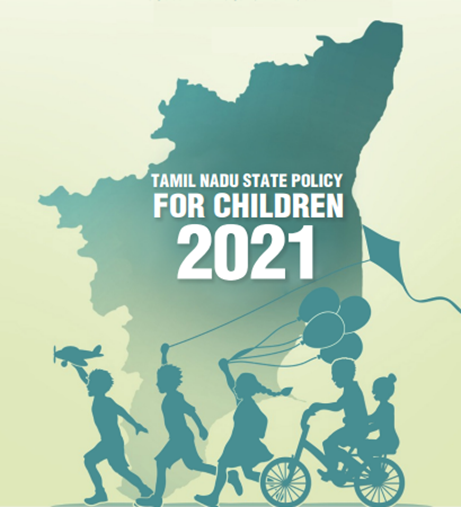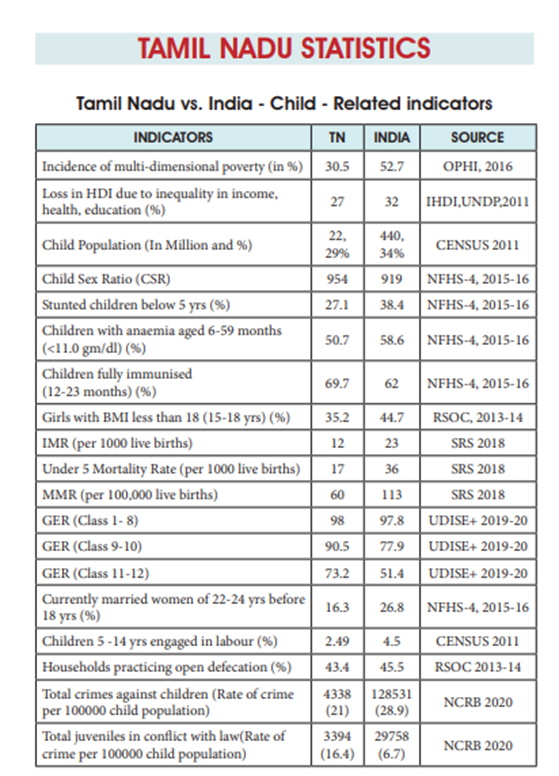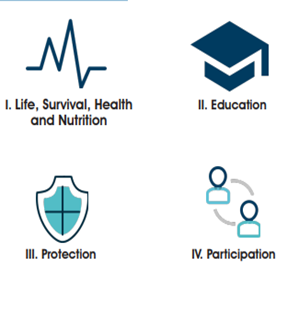PREVIOUS
Tamil Nadu State Policy for Children (TNSPC)
May 8 , 2023
1010 days
24874
0
இதன் தமிழ் வடிவத்திற்கு இங்கே சொடுக்கவும்
- All children deserve a happy childhood and the opportunity to lead a life of dignity; safe from violence, exploitation, abuse, neglect, deprivation and discrimination.
- However, the world is changing faster than ever before, and so too are the threats, challenges and opportunities facing its children.
- The problems faced by children across the globe remain largely interrelated and universal.
- While the entire country marches slowly and steadily to adhere to the tenets set by the Constitution of India, the State of Tamil Nadu (TN) has made fairly large strides in terms of overall indicators.
- TN is seen as a role-model and a pioneer for its pro-active implementation of child protection/welfare services that cater to the needs of its children.
- However, COVID-19 has exacerbated the already existing inequity in education, digital divide, learning crisis, violence against children, poverty and further increased the vulnerability of children.

TAMIL NADU STATE POLICY FOR CHILDREN (TNSPC) - AN OVERVIEW
- While the statistics clearly indicates the positive signs because of the steps taken by the Government of Tamil Nadu when compared to the indicators at the national level, the State is yet to see a more robust improvement in some of its child protection indicators like child marriage, child labour, crimes against children and the number of children in conflict with law.
- These factors pose problems and concerns for the Government, concerned stakeholders and policy makers.
- Even though Tamil Nadu fares better on many of the indices compared to the national average, the following are some issues that are preventable and needs the attention of the Government of Tamil Nadu: malnutrition, anaemia, infant mortality rate, under 5 mortality rate, child sex ratio, full immunization, body mass index, gross enrolment ratio at high and higher secondary level, open defecation, etc.
- The Government of Tamil Nadu reaffirms that its children are the State’s “supremely important asset” as emphasized in the National Policy for the Children in 1974 and 2013.
- The aim of TNSPC is to address the aforementioned issues which challenge the safety and well-being of the State’s children with special focus on adolescents, adolescent health and their vulnerability.
- All aspects affecting children, either directly or indirectly have been deliberated upon or articulated while drafting the policy. This document also emphasizes the need for protection of children in humanitarian situations.

GUIDING PRINCIPLE
- The guiding principles of the Tamil Nadu State Policy for Children (TNSPC) are based on the UN Convention on the Rights of the Child (UNCRC), 1989, National Policy for Children, 2013, the National Plan of Action 2016 and UN’s Transforming our world: The 2030 Agenda for sustainable Development.

VISION
- To ensure holistic development of every child in an enabling safe environment to reach her/his full potential and achieve the Sustainable Development Goals for children.
MISSION
- The Government of Tamil Nadu will endeavour to ensure that every child is protected from all forms of violence, abuse and exploitation, shall have access to quality health care & education, will be able to freely express his/her views on any issue concerning him/her and to ensure the principle of “Leave no one behind”.
STRATEGIC APPROACH
- The United Nations Convention on the Rights of the Child (UNCRC), in the year 1989, unequivocally stated what constitutes the rights of the child and laid down a broad frame work to uphold the rights of the Child.
- The Tamil Nadu State Policy for Children espouses this message in order to guarantee that an overall amelioration in all aspects of a child’s life cycle, vis – a – vis survival, growth, development, protection and participation is achieved.

I. LIFE, SURVIVAL, HEALTH AND NUTRITION
- The State of Tamil Nadu is committed to providing all children equitable access to life, survival, health and nutrition.
- To achieve these goals, the strategy considers the health needs of the children across all life stages.
- The State is further committed to providing adequate nutrition to every child to safeguard against hunger, malnutrition and deprivation and to meet their growth demands at different stages of their life.
- In order to increase focus and coherence across health programmes, the TNSPC identifies and mandates the following approaches, namely
- Provide high priority to investing in first 1000 days of children, the period between a woman’s pregnancy and completion of 2 years that provides a unique window of opportunity to build healthier and more prosperous future.
- Address key determinants of feticide, child mortality and morbidity; with emphasis on health, nutrition, safe potable water and high sanitation standards.
- Bottom-up increased and improved access to information, evidence and services in order to help the community take informed choices on birth, spacing of children and its impact on health.
- Strengthen public health system to work towards an improved delivery of services in terms of Reproductive and Maternal New born Child Health (RMNCH) and nutrition including pre-natal, peri-natal, ante-natal care and safe institutional delivery.
- Afford special measures for improved health care and nutrition, health and nutrition literacy for pregnant women, nursing mothers and adolescent girls using available latest technological advancements.
- Make certain that all children below the age of six have universal and equitable access to quality Early Childhood Care and Development by strengthening Anganwadis.
- Avert HIV infections at birth and make sure that infected children receive appropriate care pathway, nutrition and after-care.
- Encourage and support focused behaviour change to improve new born and child care practices at the household and community levels.
- Deliver timely interventions to prevent disabilities (both mental and physical), during, before and after pregnancy in the mother and child
- Offer services for early detection, treatment and management of disabilities at the pre-natal and post-natal stage.
- Restructure child immunization schedules based on emerging needs and intensify universal awareness programs for increased uptake of immunizations.
- Ratify only child safe products and services for children by enforcing safety standards.
- Optimize mechanisms for early detection, management and treatment of health issues among children.
- Build on currently available essential maternal and child health services.
- Build evidence-based research for health innovations.
- Focused interventions in areas of low parameters / standards.
- Ensure adequate food-security and safety is available to all children.
- Ensure adolescent friendly health services.
- Prevent micro-nutrient deficiencies by improving awareness of and access to micro-nutrient rich foods.
- Tracking children from 0 to 18 years including children of migrant labourers, street children, Children in slums, Third gender, Differently Abled Children.
II.EDUCATION
- The State of Tamil Nadu recognizes that every child has equal rights to learning, knowledge and education.
- The State also reaffirms its commitment to its responsibility to make available an enabling setting conducive to the educational requirement and well-being of the child on par with international standards.
- The State shall take all necessary steps to ensure
- Facilitation of the holistic development of children with emphasis on their strengths and empowering them to manage their lives, body and behavior.
- Provision of a safe, secure learning setting that ensures the physical, mental and emotional safety and well-being of the child.
- Access to a formal school within their neighbourhood for all children completing 5 years.
- Making high quality secondary level education affordable and accessible for all children and thereby, empowering them to reach higher education.
- Building in age appropriate, participatory and child friendly processes of teaching and learning with emphasis on gender equality, value education, life-skills and self-defence.
- Development and sustenance of systems providing quality education to everybody.
- Digital education to all children that is safe, enjoyable and age appropriate.
- Make schools free from alcohol, tobacco and all narcotic substances.
- Liaison with local governments and civil society organizations to map the gaps in availability and relevance of educational services.
- Tracking of children schools – particularly dropouts and the causes of it.
- Introduce Constitutional Rights to all children as part of regular school curriculum to promote them as responsible citizens.
- Strengthen community-based mechanisms, multi-sectoral collaboration, partnerships and convergence, working with local bodies and civil society organisations.
- Identify the children of migrant workers, who are eligible for schooling in each area; Take all efforts to continue their studies and provide opportunities for continuing education in their mother tongue; support them by all means to continue their studies without any barrier.
III.PROTECTION
- Whilst recognizing that all children deserve a happy childhood and the opportunity to lead a dignified life safe from violence, exploitation, neglect, deprivation and discrimination, the Government of Tamil Nadu resolves to build a safe and secure environment and child friendly spaces as foundation for the realization of the rights of all children in the State.
- The State shall, therefore, take the following necessary steps to:
- Strengthen and sustain community-based mechanisms to protect children from all forms of abuse (physical, emotional, sexual, neglect, denial and online), discrimination, exploitation, violence or any other activity that will harm them or affect their care, protection and overall development.
- Government of Tamil Nadu affirms its commitment towards “Zero Tolerance to any form of violence against children” and provide equal importance to protection of children as well as prevention of all forms of violence against children.
- Introduce and adopt child protection policy in all panchayats and urban bodies for creating child safe spaces in whole State of Tamil Nadu.
- Introduce child safeguarding policy in all schools to make all schools safe for children.
- Form Internal Complaints Committee under POSH Act in all schools.
- Strengthen existing child protection systems particularly Village Level Child Protection Committee (VLCPC) and Neighbourhood Child Protection Committee (NCPC).
- Create safe, respectful caring, child-friendly public, learning, media and online spaces.
- Employ special measures to ensure the rights and entitlements of children in need of special protection.
- Strengthen Family care / Alternative care and consider institutionalization as the last resort and measure.
- Implement highest standards of safety and security within all child care institutions.
- Build and enable a disaster and emergency management system for the sole purpose of protecting children.
- Promote and reinforce redressal mechanisms for safe guarding child rights at different levels.
IV. PARTICIPATION
- To ensure influence, relevance, added value and practical applicability of the policy, the State of Tamil Nadu recognizes that children are capable of forming their views.
- Respecting children and giving them opportunities to partake in matters of concern to them are some of the overarching measures that will be adopted by the State.
- Some of the other necessary actions that will be taken shall include
- Ensuring that children are apprised of their rights, provided with prospects to develop their skills, build on their aspirations and express their views, in accordance with their age, maturity and capacities.
- Promote linkages and strengthen platforms for children to express their opinions and needs.
- Building opportunities for children to engage in issues of concern to them.
- Promote and strengthen respect for the views of the child, especially those of girl children.
- Establishing benchmarks to measure the extent of children’s participation in the family, schools and community is being realized, and backing these up with evidence-based research and independent valuations.
- Building a strong partnership with CSOs, INGOs / NGOs, Networks, Corporates and Academic institutions by forming a “Civil Society Support Group for children for consultations and advisory support”.
- Strengthening of local bodies, community-based organisations, inter-departmental convergence and coordination to consolidate multi-sectoral actions.
- Building a strong sustainable model of programming for children based on Tamil Nadu State Policy for Children for a stronger equity-focused approach by identifying the most deprived children, investing in new proven and cost-effective interventions, overcoming bottlenecks and partnering with International and National Organisations and communities.
- Creation of Bala Sabhas in all Gram Panchayats where all children in the age group of 12-18 are members.
- Bala Sabhas to meet at least four times in a year as Gram Sabha, pass resolutions on matters related to children and submit it to Gram Sabha to take appropriate action by affirming the resolutions passed in Bala Sabha.
CONCLUSION
- The Government of Tamil Nadu articulates its commitment towards its children with the current policy, 2021, thereby assuring that all children in the State shall have an enabling milieu for their growth and development, and that their rights will be guaranteed throughout their childhood.
- In this context, the Tamil Nadu State Policy for Children (TNSPC-2021) will take all obligatory actions to guide and apprise stakeholders on all laws, policies, plans and programmes concerning children.
- The document represents a call for action to prioritize child protection on the state agenda.
- The policy shall be revised every five years by reviewing the outcomes / impact achieved in the said period through an evidence-based appraisal and indicators of Sustainable Development Goals.
- It is expected that increased programmatic collaboration will strengthen system-wide coherence at all levels. The goal areas, change strategies and enablers outlined in this policy brief will help deliver lasting results for children, bringing the State closer to realizing the vision of its constitutional agenda, a land in which no child is left behind.
- - - - - - - - - - - - - - - - - - - - - - - -
Leave a Reply
Your Comment is awaiting moderation.


